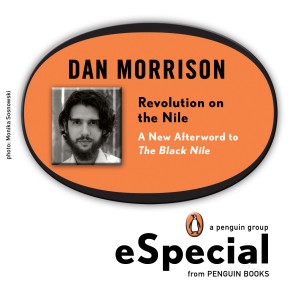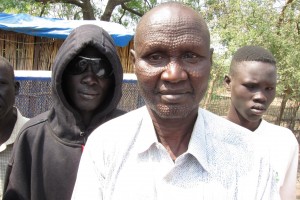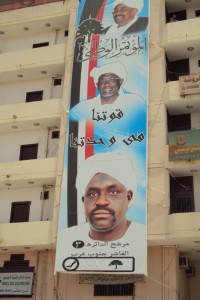Travel, literature, and a little too much gunfire: Andrew Burmon talks with Dan Morrison about The Black Nile.
Leaving South Sudan with a Broken Gear Stick
 * Cruising on jellied asphalt through the northern badlands of South Sudan when the unthinkable happens. An excerpt from The Black Nile on NationalGeographic.com
* Cruising on jellied asphalt through the northern badlands of South Sudan when the unthinkable happens. An excerpt from The Black Nile on NationalGeographic.com
* In Cairo, riots, repression, and a room full of dancing men. A diverting excerpt from The Black Nile, courtesy our friends at Swink Magazine in Los Angeles.
Southern Kordofan: No backing down
The northern wing of the Sudan People’s Liberation Movement has issued a strong statement committing itself to the Garangist vision of a reformed Sudan, with “No Compromise, No Retreat” in Southern Kordofan. Today’s statement comes after a two-day meeting attended by Blue Nile state governor Malik Agar, Southern Kordofan commander Abdelazis El Hilu, and SPLM Secretary General Yasir Arman.
The SPLM says that any peace negotiations must take place outside Sudan, under the auspices of a third-party mediator. President Omar al Bashir’s position is the opposite: Negotiations will take place only in Sudan, he says. The SPLMN’s full statement is below.
Revolution on the Nile
 In just eight days a new country, the Republic of South Sudan, will be born. It’s a huge step – but not the last step – in a 55-years-and-counting struggle for dignity and self-determination.
In just eight days a new country, the Republic of South Sudan, will be born. It’s a huge step – but not the last step – in a 55-years-and-counting struggle for dignity and self-determination.
The south’s departure from Sudan has been as troubled as its union, with the recent fighting in Southern Kordofan and Abyei, as well as continuing insurgencies by southern renegades including George Athor and Peter Gadet. The Lord’s Resistance Army, too, remains active in the western part of the new country.
These are only the most obvious and immediate challenges faced by the southern people. Southern Sudan’s leaders, its people, and its nascent institutions will have to struggle mightily to prevent their new state from resembling the old Sudan in its approach to human rights, inclusivity, opportunity, and rule of law.
None of this should take away from the gigantic achievement that southern Independence represents. Millions died and millions more were made homeless, and endured famine, captivity and fear to get to July 9: A delicious and hugely challenging Year One. Democracy entails the right of the people and their representatives to make mistakes, to take responsibility for those errors (to “own” them, in the current parlance) and make corrections. It won’t be at all easy. But it’s a great, historic moment.
On July 5, Penguin Books will publish Revolution on the Nile, my new Afterword to The Black Nile, as an “e-special” available on the Kindle, the Nook, and Apple’s iPad, iPhone, and iTouch, as well as other e-readers. Revolution on the Nile updates The Black Nile with an account of south Sudan’s January freedom referendum, squashed attempts at public protest in northern Sudan, and the electrifying revolt against Hosni Mubarak in Egypt.
Sudan Cracks Up
 My four-day series on the coming breakup of Sudan in Slate magazine has received good notices from the likes of The Village Voice, The Browser, Bobby Ghosh of Time magazine, Microkhan, and the Wandering Savage.
My four-day series on the coming breakup of Sudan in Slate magazine has received good notices from the likes of The Village Voice, The Browser, Bobby Ghosh of Time magazine, Microkhan, and the Wandering Savage.
In case you missed the tasty 7,500-word opus, here’s a recap:
Part 1: Meet the Bernie Madoff of Sudan
Part 2: Fighting for Freedom in the New Sudan
Part 3: South Sudan: A Million Mutinies Now?
Part 4: South Sudan’s Oil Curse
Since the series began running, the insurgent militia leader Lt. General George Athor, who I quote in Part 3 of the series, has continued his private war in Jonglei state at the cost of some 300 lives. I’m posting, after the jump, notes from my January interview with Athor. I’ll reserve comment except to say the statements of this former golden boy of the Sudan People’s Liberation Army are extremely self-serving.
That’s all for now. I’m off to write a new chapter of The Black Nile to be included in the book’s upcoming Penguin paperback edition. So much has changed on the Nile this year, and so much of if for the better, that I felt the book needed an update.
Meet the Bernie Madoff of Sudan
 There’s an old saying in Darfur that goes: Kalash au bilash; Kalash begim al kash.
There’s an old saying in Darfur that goes: Kalash au bilash; Kalash begim al kash.
Translation: “You’re trash without a Kalashnikov; get some cash with a Kalashnikov.”
My newest story at Slate.com is about a Darfur police corporal who stole millions without ever flashing a gun.
I hope you enjoy the story of Adam Ismael, his $180 million Ponzi scheme, and Omar al-Bashir’s economic war on Darfur. It’s the first installment in a four-day series on the coming breakup of Sudan. (And here’s a piece I wrote from Sudan in January during the south’s historic independence vote.)
A Glowing Review in The Washington Post
 Travel writer Tahir Shah has published a glowing review of The Black Nile in the Washington Post. It’s especially gratifying coming from an author who knows first-hand the joys, burrs, and dangers of off-the-grid travel and reporting. Here’s an excerpt:
Travel writer Tahir Shah has published a glowing review of The Black Nile in the Washington Post. It’s especially gratifying coming from an author who knows first-hand the joys, burrs, and dangers of off-the-grid travel and reporting. Here’s an excerpt:
Morrison’s experience as a journalist shines through, as does his use of humor, which frames subjects of utter horror. These include intertribal conflict, pestilence, and the dams and deforestation that have destroyed swaths of East Africa’s ancient habitat. In the southern Sudanese town of Juba, Schon cooked up his last plates of oily spaghetti and came clean about not wanting to go on, especially since “on” was into the “malarial tinderbox” of the Sudd swampland, where “the war wasn’t quite finished in Upper Nile state — antagonistic militias stewed in camps while their leaders grappled for political power.” After his childhood buddy leaves, Morrison continues alone, and, now that the author can turn his full attention to the landscape around him, the travelogue steps up a notch. What’s impressive is how well he describes without judging. The Africa he depicts is a place where tribal rivalry complements religious and political friction; where illness, disease and utter poverty shape the lives of the majority, who lack the safety nets that so often catch Westerners when we fall.
As the journey progresses, it becomes much less of a whimsical jaunt and much more of a hard-edged report. This is Morrison at his best, lean and hungry in wild wastelands of Africa’s Sahel. His description of the Sudanese capital is memorable : “A dense static of orange grit came screaming from the desert; it filled the sky and trapped Khartoum’s eight million souls in a suffocating and radiant silica heat.”
Click here to buy your copy of The Black Nile.
And check out Tahir Shah’s most recent new book, In Arabian Nights: A Caravan of Moroccan Dreams.
An international man of anonymity.

Who is the mystery Londoner who helps move guns to the Islamist-led government of Sudan and invests the regime’s money in Europe? Continue reading “An international man of anonymity.”

